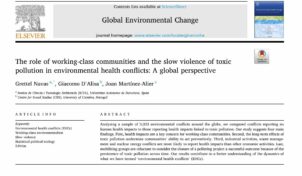
By Grettel Navas, Giacomo D’Alisa and Joan Martínez-Alier
Available here or at https://doi.org/10.1016/j.gloenvcha.2022.102474
Abstract
Analysing a sample of 3,033 environmental conflicts around the globe, we compared conflicts reporting no human health impacts to those reporting health impacts linked to toxic pollution. Our study suggests four main findings. First, health impacts are a key concern for working-class communities. Second, the long-term effects of toxic pollution undermine communities’ ability to act preventively. Third, industrial activities, waste management and nuclear energy conflicts are more likely to report health impacts than other economic activities. Last, mobilising groups are reluctant to consider the closure of a polluting project a successful outcome because of the persistence of toxic pollution across time. Our results contribute to a better understanding of the dynamics of what we have termed ‘environmental health conflicts’ (EHCs).
Highlights
• Environmental health conflicts (EHCs) differ from non-Environmental health conflicts.
• Human health related issues are key concerns in working-class environmentalism.
• Delayed effects of pollution affect preventive actions in EHCs.
• Halting a project is not enough to consider a successful outcome in EHCs.

The project ENVJUSTICE has received funding from the European Research Council (ERC) under the European Union’s Horizon 2020 research and innovation programme (grant agreement No. 695446)